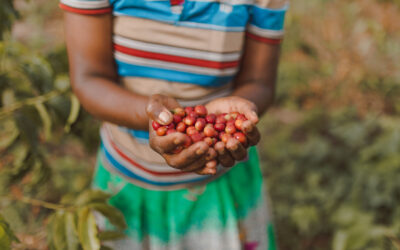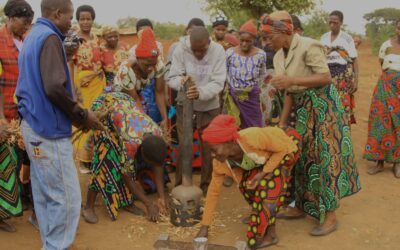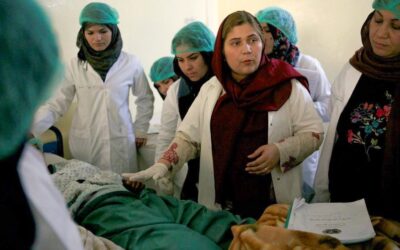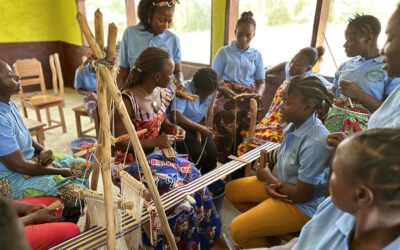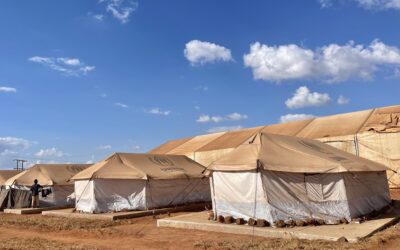What Was USAID, and What Now?
USAID has made news headlines constantly over the last few months. You may find yourself wondering: what is USAID, and is One Day’s Wages affected by its dismantling?
As a global development organization, we at ODW care deeply about the people who depend on foreign aid, especially during times of crisis. When rapid changes were taking place, we reached out to our ODW partners and found that 25% of our current partners were implementing programs with the support of USAID funds. All of those partners’ awards were terminated. Beyond the organizations directly affected, many of our partners work in communities where people rely on U.S. foreign aid for essentials like food, medications, and services for vulnerable children.
ODW does not receive government funding, in part because we’re passionate about local leaders leading the way: designing their own programs in response to their communities’ unique contexts, needs, and dreams. We wire all of the program funds we raise directly to our partner organizations: no fees, no intermediaries, no strings attached. Our processes look different from those of USAID. At the same time, we believe it takes all of us working together – learning from each other and uplifting our neighbors – to create a more just and beautiful world.
So what exactly is USAID, and what happened over the last two months?
In 1961, the world was changing rapidly.
European economies were rebuilding and rebounding after the devastation of World War II, assisted by billions of dollars in aid from the United States. As democracies grew, Soviet influence expanded. The Soviet Union launched the first man into space, and East Germany began building the Berlin Wall – a visible reminder of the divide between East and West.
To counter the perceived threat of communism, President John F. Kennedy leaned into soft power – the use of programs and policies that promote capitalism, tout democracy, and position the U.S. as a global leader. In 1961, Kennedy established the U.S. Agency for International Development (USAID) to provide foreign aid and development assistance while advancing democracy.
Since then, USAID has made significant contributions to global development, investing in health, education, and infrastructure in all regions of the world. Each year, Congress reviews programs and appropriates funds, allocating on average 1% of the country’s annual budget toward foreign assistance. Based on Congressional priorities, grants are awarded to non-government organizations (NGOs) and contractors that implement activities and then report back on their impact.
Over 64 years, USAID has provided life-saving antiretroviral treatment for an estimated 25 million people living with HIV; connected over 29 million homes in Sub-Saharan Africa to electricity for the very first time; promoted free and fair elections; and delivered billions of emergency meals in countries experiencing famine like Ethiopia, North Korea, and Somalia. Like in any organization, not all projects were successful, but the agency received broad bipartisan support and became the world’s largest aid donor.
Recently, a rise in populism, polarization, and protectionist policies has led several global powers to reconsider their contributions to foreign aid. On January 20, President Donald Trump began his second term in office by issuing a series of executive actions that ultimately led to the dismantling of USAID within just two months. A memo to Congress on March 24 revealed the depths of the damage: 86% of USAID programs were terminated, nearly all 10,000+ agency staff were fired, and all funding was eliminated for education, conflict mediation, civil society, and infrastructure. With USAID now shuttered, the few remaining programs will be absorbed into the State Department, with aid work moved under a proposed new U.S. Agency for International Humanitarian Assistance (USAIHA).
A flurry of reactions have followed: those celebrating the savings of eliminating most foreign aid; those reeling from the impact of lost employment; those warning against the U.S.’s loss of soft power; and those urging for reform within a system long critiqued for its bureaucracy and the entanglement of aid with politics. Yet many – like us – agree that the rapid process has not allowed for thoughtful change. Dismantling does not equal reform.
Already we are seeing the impacts. A wide variety of NGOs with terminated USAID awards or lack of payments for completed work are struggling to survive. Countries like Senegal, Nepal, El Salvador, and Sierra Leone – where 100% of USAID-funded work was terminated – are scrambling to fund needed work. 53 million people no longer have bed nets and treatment to protect themselves from malaria. And when a 7.7 magnitude earthquake rocked Myanmar on March 28, the U.S. was not able to deploy urgently needed search-and-rescue teams as would have been standard just months earlier.
One Day’s Wages is not an alternative to USAID. No funder can fill that $60 billion gap.
Yet we hope that the U.S. – as the world’s wealthiest country – can recognize the importance of supporting our global neighbors in thoughtful and strategic ways. And we remain more convinced than ever that local organizations like our ODW partners are the ones leading the way to uplift those experiencing extreme poverty.
More stories of impact
When Generosity Sounds Like a Song: An Invitation to Create Together
At One Day’s Wages, we are endlessly inspired by what happens when people bring their full selves—their creativity, curiosity, and courage—into a shared mission. Our work to alleviate extreme poverty has always been built on partnership. Not just with grassroots...
Ways to Give: Simple, Meaningful Options That Fit Your Life
Generosity isn’t one-size-fits-all. At One Day’s Wages, we believe giving should feel accessible, thoughtful, and aligned with your real life—whether you’re just starting out, raising a family, building a business, or planning your legacy. Here are several ways our...
Starting With Strengths: How Asset-Based Development Can Transform Communities
When people talk about community development, the conversation often begins by listing what’s missing: clean water, farming knowledge, health clinics, and more. And while understanding needs is important, defining communities by their needs can paint them as passive,...
One Day’s Wages Named Together Women Rise 2026 Featured Grantee for Maternal Health Work in Afghanistan
One Day’s Wages (ODW) is honored to announce its selection as the 2026 Featured Grantee of Together Women Rise, a powerful global community of women and allies committed to advancing gender equality. This prestigious award includes a $50,000 grant over two years...
Women at Work: Toward Inclusion in the Global Workforce
Can you remember the last time you couldn’t make it to work? Maybe your nanny canceled, and you were left without childcare. Or maybe your car battery died, and you didn’t have a safe way to get to the office. These are the kinds of barriers that women around the...
Standing in Solidarity When the World Turns Away
We cannot fix every broken system. But we can choose to stand in solidarity with those who cross our path. This choice, this posture of care and action, is what fuels us at One Day’s Wages. And it’s why we need each other, now more than ever. Recently, our Global...
LEARN
Leadership
Transparency
Read the Latest
Contact Us
COLLABORATE
Faith Groups
Schools
Businesses
Get Involved
One Day’s Wages exists to alleviate extreme poverty by investing in, amplifying, and coming alongside locally led organizations in underserved communities.
©2026 One Day's Wages is a registered 501(c)(3) organization | Tax ID #26-2566653 | Privacy policy | Terms of use
P.O. BOX 17575 Seattle, WA 98127 | Contact us


